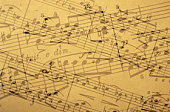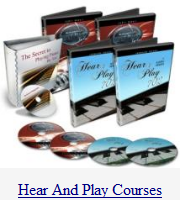
Home > Songwriting
|
Piano Songwriting & Song Composition(Scroll down to see the full list of lessons in this section)
In this section of the website, we will go over a few tips on how to start composing your own songs on the piano and how you can take song writing to a higher level. Before we get into the meat of the article, and before we even talk about how to compose songs on piano, there are a few things to take into consideration. The first is that you need to be able to write music in order to start songwriting on the piano. This means that you should have a full knowledge of both the treble and the bass clef. You also need to understand how to notate note values and how to use ledger lines when the time comes, as it will. If you aren’t fully familiar with all of these aspects of sheet music, you need to take some time to learn them before composing a song. It is extremely important to be able to write down your music. Leaving things to memory is a key element for disaster. You are taking the chance that, once your memory drifts, you will lose all of your writing. Don’t take the risk; learn the basics. Once you are fully familiar with transcription, try starting out with a basic pattern. Work on a four bar pattern, and try supplementing notes. This will allow you to get a feel for experimenting with your writing.
The easiest way to work when composing is to transcribe and play simultaneously. This means, don’t wait for the entire song to come and then try and remember it and jot it all down. When you come up with a section, write it out. Order doesn’t matter; you can always rearrange the sections later by rewriting the piece. This will assure that you aren’t forgetting any bits or pieces of the song. When you compose songs on piano, be sure that you do it correctly. The last thing that you want to do is be in such a rush that you notate incorrectly. Make sure that you are transcribing the proper notes. If you are playing chords on piano, make sure that you are adding the accidentals if any are involved. As we said earlier; don’t leave anything to memory. That is taking a fifty-fifty risk that you might forget it and come up with something completely different when you sit down again to play it. In the end, the best way to improve your composition skills is by practicing. Set aside a block of time each day and dedicate it to working on compositions. Little by little, you will see your skills increase. Have fun, and stick to it.
Check out Perfect Pitch Supercourse for the proven method of learning perfect pitch... Lessons on Composing Songs And Writing Melodies:
|
|
Although every attempt has been made to make information as accurate as possible, we are not responsible for any errors that may appear.
 Learning to write songs is one of the most intimate processes a musician can go
through. Every note, from start to finish, is an extension of yourself. From phrasing to chord choices, your
song is a representation of yourself.
Learning to write songs is one of the most intimate processes a musician can go
through. Every note, from start to finish, is an extension of yourself. From phrasing to chord choices, your
song is a representation of yourself.
 As a musician, it is important that you learn to do so; the first take won’t
always be the best. You need to learn how to substitute notes to try different overall sounds. Keeping your
mind open is a great way to approach writing. Never be afraid to try something different with a pattern you
have already written –you might improve it.
As a musician, it is important that you learn to do so; the first take won’t
always be the best. You need to learn how to substitute notes to try different overall sounds. Keeping your
mind open is a great way to approach writing. Never be afraid to try something different with a pattern you
have already written –you might improve it.




